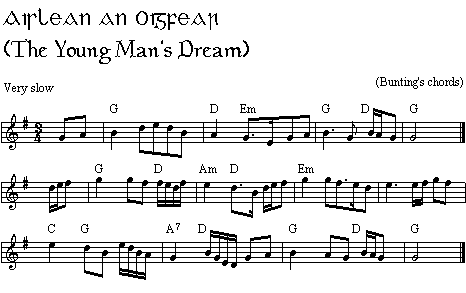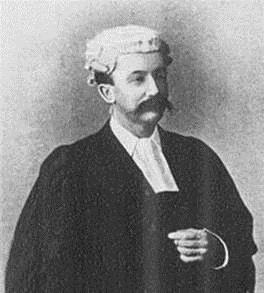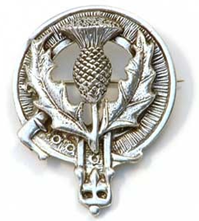|
Oh Danny Boy, the pipes, the pipes are calling.
Anyone who plays Irish music must be ready to field
countless requests for this song, particularly around St.
Patrick's Day. There is no doubt about its popularity with those
who know little about traditional Irish music, and even with the
older generation of Irish-Americans. But newly arrived
immigrants from Ireland have frequently never heard of Danny
Boy! Where did the song come from? Is it Irish at all?
To begin with, Danny
Boy is one of over 100 songs composed to the same tune;
Londonderry Air. This title has a certain political bias, since
the name "Londonderry" is used to emphasize the ties between
Northern Ireland and Britain (referring to the colonization of
the area by English settlers in the early 17th century). Irish
nationalists usually prefer to use "Derry", the original name of
the Northern city and county. It appears that the title Air
from County Derry was also used. It is popular among the
Irish diaspora and is very well known throughout the world. The
tune is played as the victory anthem of Northern Ireland at the
Commonwealth Games.
The first appearance of
the tune in print occurred in 1855, in Ancient Music of
Ireland, published by the early collector George Petrie
(1789-1866). The untitled melody was supplied to Petrie by Miss
Jane Ross of Limavady, County Londonderry, who claimed to have
taken it down from the playing of an itinerant piper.
In 1974, Hugh Shields found a
long-forgotten traditional song which was very similar to
Gilchrist's modified version of the melody. The song, Aislean
an Oigfear (recte Aisling an Óigfhir, "The young
man's dream"), had been transcribed by Edward Bunting in 1792
based on a performance by harper Donnchadh Ó Hámsaigh (Denis
Hempson) at the Belfast Harp Festival.

Bunting published it in
1796. Ó Hámsaigh lived in Magilligan, not far from Ross's home
in Limavady. Hempson died in 1807. In 2000, Brian Audley
published his authoritative research on the tune's origins. He
showed how the distinctive high section of the tune had derived
from a refrain in The Young Man's Dream which, over time, crept
into the body of the music. He also discovered the original
words to the tune as we now know it which were written by Edward
Fitzsimmons and published in 1814; his song is 'The Confession
of Devorgilla', otherwise known by its first line 'Oh Shrive Me
Father'.

So…back to Danny Boy.
The author was an English lawyer, Frederic Edward Weatherly
(1848-1929), who was also a songwriter and radio entertainer. In
1910 he wrote the words and music for an unsuccessful song he
called Danny Boy. In 1912 his sister-in-law in America
sent him a tune called Londonderry Air, which he had
never heard before. Weatherly modified the lyrics of "Danny Boy"
to fit the rhyme and meter of "Londonderry Air”, and published a
revised version of the song in 1913. As far as is known,
Weatherly never set foot in Ireland.
The most prolific poet of the
Edwardian—and for that matter Victorian and Georgian—ballad, the
genial and indefatigable Weatherly was virtually a one-man song
factory. He wrote thousands of lyrics, of which at least fifteen
hundred were published. The law was as much a love as poetry,
and he studied and was called to the Bar at the age of
thirty-nine, thereafter enjoying a comfortable career on the
Western Circuit, often appearing in criminal cases, almost
invariably for the defense. According to his own account, in
court he was remarkably keen-witted and effective. Songs poured
from him, he translated opera and he published quantities of
verse and children's books. He reveled in his considerable
celebrity. A little man physically, he had, as a friend put it,
'a blithe and tender soul'. He may have been self-satisfied but
he was much loved and was certainly no fool, cheerfully
dismissing his facility as a lyricist as no safe ticket to
Parnassus. His most commercially successful ballad was 'Roses of
Picardy' which became one of the great popular songs of the
Great War, and it made its writer a small fortune.
There are various theories
as to the true meaning of "Danny Boy". Some listeners have
interpreted the song to be a message from a parent to a son
going off to war or leaving as part of the Irish diaspora. The
1918 version of the sheet music included alternative lyrics ("Eily
Dear"), with the instructions that "when sung by a man, the
words in italic should be used; the song then becomes "Eily
Dear", so that "Danny Boy" is only to be sung by a lady". In
spite of this, it is unclear whether this was Weatherly's
intent.
Oh, Eily dear, the pipes, the pipes
are calling
From glen to glen, and down the mountain side
The summer's gone, and all the roses falling
It's I, it's I must go, and you must bide.
But I'll come back when summer's in the meadow
Or when the valley's hushed and white with snow
And you'll be here in sunshine or in shadow
Oh
Eily dear, oh Eily dear, I love you so.
Someday, may be, when all the flow'rs
are dying
And I am dead, as dead I well may be
Ye'll come and find the place where I am lying
And kneel and say an Ave there for me.
And I shall hear, though soft you tread above me
And all my grave will warmer, sweeter, be
For you will bend and tell me that you love me
And
I shall sleep in peace until you come to me.
Here’s my rendition of the tune. You
are welcome to edit it to your heart’s content.
|
|
Popular Lyrics
Oh, Danny boy, the pipes, the
pipes are calling
From glen to glen, and down the mountain side
The summer's gone, and all the flow'rs are dying
'Tis you, 'tis you must go and I must bide.
But come ye back when summer's
in the meadow
Or when the valley's hushed and white with snow
'Tis I'll be here in sunshine or in shadow
Oh, Danny boy, oh, Danny boy, I love you so.
And if you come, and all the
flowers are dying
If I am dead, as dead I well may be
I pray you'll find the place where I am lying
And kneel and say an “Ave” there for me.
And I shall hear, though soft
you tread above me
And all my grave will warm and sweeter be
If you'll not fail to tell me that you love me
*And I shall sleep in peace until you come to me.
or
I'll simply sleep in peace until you come to me.
or
And I shall rest in peace until you come to me.
or
Oh, Danny boy, oh, Danny boy, I love you so.
|



